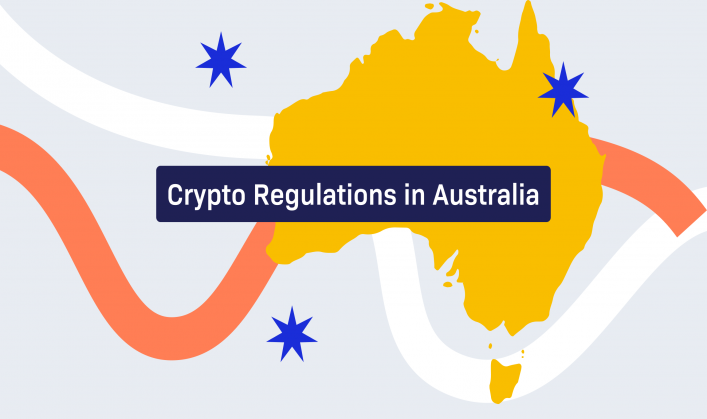7 November 2025
A Guide to the Cryptocurrency Laws of Australia
Regulation of Cryptocurrencies is becoming more important as their use becomes more widespread. Because of the dynamic nature of the Cryptocurrency industry, it is essential to monitor changes in Cryptocurrency legislation throughout the world. We have compiled a national guideline for Cryptocurrency Companies in Australia to assist you in understanding the numerous requirements placed upon you by the government. Learn more about the government's strategy to regulate Cryptocurrency exchanges as well as marketplaces with the aid of our in-depth national analysis. Several topics of bitcoin regulation are also discussed.
Also Read: US Crypto Regulations' Competing Priorities
Five percent of Australia's population, or over a million people, own Cryptocurrencies. In fact, according to some polls, 20% of Aussies already own Cryptocurrency. The number of individuals working in the nation's industries is, without a doubt, growing. Nevertheless, only around 20% of bitcoin investors may really understand the dangers of their holdings. Participants have a good chance of losing some or all of their money due to breaches, frauds, rug pulls, or insolvency in the Cryptocurrency industry.
Also Read: Why Did China Prohibit Cryptocurrencies?
Blockchain Australia’s Custodial Exchange Legislation
The leading Australian trade group for the blockchain and digital assets community published a press release on November 17, 2022, urging the government to regulate custodial exchanges to safeguard investors. Blockchain Australia claims that the sudden failure of FTX Virtual Assets will have serious monetary consequences for several Australian consumers. They argue that the demise would bring disrepute to Australian Cryptocurrency exchanges, despite the fact that these exchanges operate in accordance with best practices as well as Blockchain Australia's Conduct Code. In addition, Blockchain Australia voiced its backing for the Australian administration's decision to begin discussions this year (2023) to ensure the security of Crypto custody arrangements and to regulate exchanges.
The legality of Cryptocurrency in Australia
In Australia, Bitcoin (BTC) and other Cryptocurrencies are fully recognized as legal currency and are viewed as property. The use of Cryptocurrencies as a medium of exchange is sanctioned by law and retailers are under no obligation to embrace them as payment. The balanced as well as stable market conditions that have historically existed in Australia for blockchain and Cryptocurrencies have fostered the development of cutting-edge transactions, Cryptocurrency assets, lending, investing, as well as depository service technologies. In 2017, both Cryptocurrencies and Cryptocurrency exchanges were recognized by the law. From then on, Australian legislation has not gotten in the way of the internet sector at all, instead welcoming the new possibilities it brings with it. In 2018, meanwhile, Cryptocurrency legislation in Australia included AML and CTF safeguards due to the fact that transferring value in digital currencies includes processes that might assist those criminal activities. This is why the AML and CFT regime began to include digital currency in 2006, as per the Finance Act 2006.
Regulatory Approach of ASIC to Cryptos
The viewpoint of ASIC is shared by other regulatory bodies throughout the world. Organizations planning an Initial Coin Offering (ICO) or coin sales are encouraged by ASIC to consult with experts in the field, such as attorneys, and reach out to the organization's Innovation Center for informal guidance. It demonstrates its openness to increasing institutional investors' comfort with Cryptocurrencies. As a result of problems with disclosure and advertising materials, as well as the provision of financial instruments without an AFSL, ASIC has taken action to halt prospective token sales aimed at retail consumers.
Cryptocurrency Regulation in Australia
Traditionally speaking, the Australian authorities have taken a somewhat relaxed stance toward the regulation of Crypto asset markets. On the other hand, in light of the recent dramatic events that have taken place in the Cryptocurrency area, there have been demands for the development of a more effective regulation of digital currency that is focused on the protection of consumers as well as the stability of the industry. Even if the native territory does not consider Cryptocurrency as its own distinct field of law, it is possible for Cryptos to be included in the various regulations that are already in place outside the Australian constitution.
Cryptocurrencies’ Status in Australia
The Australian Securities and Investments Commission (ASIC) states that the coins' or tokens' legal status is determined by the ICO's design and the rights associated with them. Coins and tokens are liable to the regulatory system governing financial services in Australia if they meet the criteria for an interest in a managed investment plan or collective investment vehicle, a security, a derivative, or the broader definition of a financial product. When it comes to determining whether or not they're subject to legal and regulatory responsibilities, players in the Crypto asset industry may look to the guidance offered by ASIC in INFO 225. Coins and tokens that meet the definition of a monetary item are subject to declaration, administration, licensure, as well as behavioral duties imposed by the Companies Act. Whether the tokens or coins exchanged on the platform are considered financial products, the operator of the exchange may be required to possess an Australian market license, and entities that facilitate Cryptocurrency payments may also be required to hold an AFSL.
Disclaimer: The author’s thoughts and comments are solely for educational reasons and informative purposes only. They do not represent financial, investment, or other advice.






